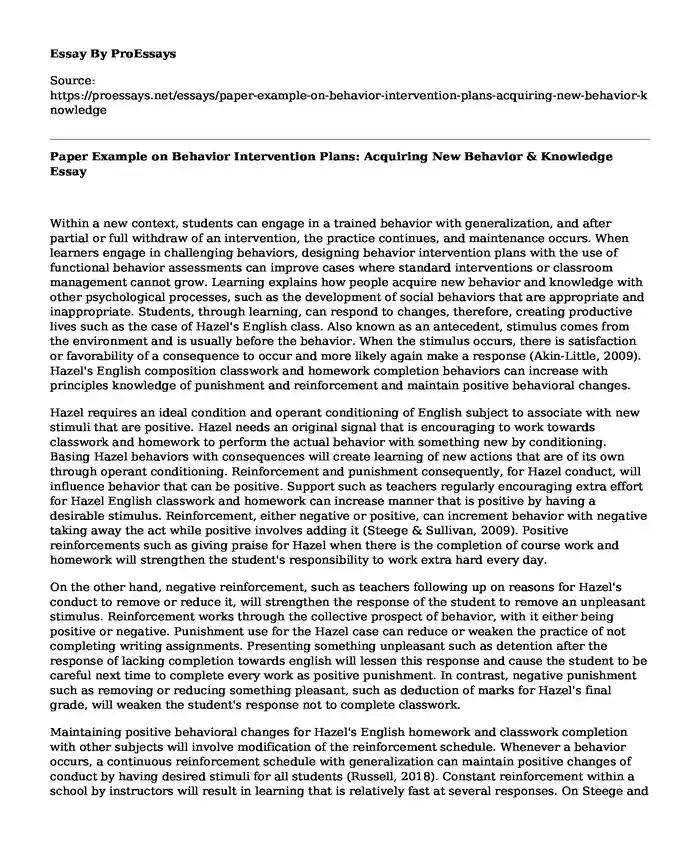Within a new context, students can engage in a trained behavior with generalization, and after partial or full withdraw of an intervention, the practice continues, and maintenance occurs. When learners engage in challenging behaviors, designing behavior intervention plans with the use of functional behavior assessments can improve cases where standard interventions or classroom management cannot grow. Learning explains how people acquire new behavior and knowledge with other psychological processes, such as the development of social behaviors that are appropriate and inappropriate. Students, through learning, can respond to changes, therefore, creating productive lives such as the case of Hazel's English class. Also known as an antecedent, stimulus comes from the environment and is usually before the behavior. When the stimulus occurs, there is satisfaction or favorability of a consequence to occur and more likely again make a response (Akin-Little, 2009). Hazel's English composition classwork and homework completion behaviors can increase with principles knowledge of punishment and reinforcement and maintain positive behavioral changes.
Hazel requires an ideal condition and operant conditioning of English subject to associate with new stimuli that are positive. Hazel needs an original signal that is encouraging to work towards classwork and homework to perform the actual behavior with something new by conditioning. Basing Hazel behaviors with consequences will create learning of new actions that are of its own through operant conditioning. Reinforcement and punishment consequently, for Hazel conduct, will influence behavior that can be positive. Support such as teachers regularly encouraging extra effort for Hazel English classwork and homework can increase manner that is positive by having a desirable stimulus. Reinforcement, either negative or positive, can increment behavior with negative taking away the act while positive involves adding it (Steege & Sullivan, 2009). Positive reinforcements such as giving praise for Hazel when there is the completion of course work and homework will strengthen the student's responsibility to work extra hard every day.
On the other hand, negative reinforcement, such as teachers following up on reasons for Hazel's conduct to remove or reduce it, will strengthen the response of the student to remove an unpleasant stimulus. Reinforcement works through the collective prospect of behavior, with it either being positive or negative. Punishment use for the Hazel case can reduce or weaken the practice of not completing writing assignments. Presenting something unpleasant such as detention after the response of lacking completion towards english will lessen this response and cause the student to be careful next time to complete every work as positive punishment. In contrast, negative punishment such as removing or reducing something pleasant, such as deduction of marks for Hazel's final grade, will weaken the student's response not to complete classwork.
Maintaining positive behavioral changes for Hazel's English homework and classwork completion with other subjects will involve modification of the reinforcement schedule. Whenever a behavior occurs, a continuous reinforcement schedule with generalization can maintain positive changes of conduct by having desired stimuli for all students (Russell, 2018). Constant reinforcement within a school by instructors will result in learning that is relatively fast at several responses. On Steege and Sullivan's article, the procedure devises on assessed student progress with evidence-based intervention to teach skills (Steege & Sullivan, 2009). The report involves learning positive maintenance and generalization of student behaviors by defining, promoting, and describing trained conduct. Procedures include the use of response and situation generalization with response maintenance. Maintaining positive behavioral changes to all subjects involves systematic planning, and the article in promoting generalization meets reinforcement as existing contingencies. Through teaching and within all environments of schools identifying desired behavior changes determines which conducts require instruction. Learning criterion involves change, endures over time, and occurs through experience; therefore, behaviors can deliberately change in societies.
References
Akin-Little, A. E., Little, S. G., Bray, M. A., & Kehle, T. J. (2009). Behavioral interventions in schools: Evidence-based positive strategies. American Psychological Association.
Russell, D., Ingvarsson, E. T., Haggar, J. L., & Jessel, J. (2018). Using progressive ratio schedules to evaluate tokens as generalized conditioned reinforcers. Journal of applied behavior analysis, 51(1), 40-52., 10.1002/jaba.424
Steege, M. W., & Sullivan, E. (2009). Generalization and maintenance of learned positive behavior.
Cite this page
Paper Example on Behavior Intervention Plans: Acquiring New Behavior & Knowledge. (2023, Sep 25). Retrieved from https://proessays.net/essays/paper-example-on-behavior-intervention-plans-acquiring-new-behavior-knowledge
If you are the original author of this essay and no longer wish to have it published on the ProEssays website, please click below to request its removal:
- The Problem with Fat Talk by Renee Engeln - Article Analysis Essay
- Observation Report: English Program for the International Staff Working at a University
- Classroom Observation: Garrett Case Study Paper Example
- Pathways Between Bullying Victimization, Depression, Academic Achievement, and Problematic Drinking in Adolescence
- Essay Sample on Adolescents: Mental Health Issues and Self-Harm Risk
- ABC's Model: Examples of Behaviors & Impacts - Essay Sample
- Paper Sample on Exploring Critical Thinking Skills in UAE Social Science Undergraduates







